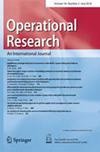了解货运司机的行为以及对车辆燃油消耗和二氧化碳排放的影响
IF 2.7
4区 管理学
Q2 OPERATIONS RESEARCH & MANAGEMENT SCIENCE
引用次数: 0
摘要
尽管驾驶员行为对燃料消耗和二氧化碳当量(CO 2 e)排放有显著影响,但这一现象在公路货运研究中往往被忽视。我们回顾了相关的文献,并试图提供货运司机的行为和燃料消耗之间的关系的更深层次的理解。本研究利用货运物流部门的4000多个驾驶记录的真实数据集来检查特定行为对燃料消耗的影响。分析的行为包括剧烈的加速/减速/转弯,过度转速,每分钟转数(RPM)过多,以及不遵守20至70英里每小时(mph)的法定速度限制。我们的研究结果证实了现有的文献,证明了某些驾驶特性,特别是苛刻的加速/转弯,对燃料消耗的重大影响。此外,我们的研究为该领域提供了新的见解,特别是强调了不遵守20和30英里/小时的法定速度限制对燃油消耗的重大影响,这是之前研究中没有广泛研究的一个方面。随后,我们引入了一种先进的燃油消耗模型,该模型将这些已识别的驾驶员行为考虑在内。该模型不仅促进了对公路货物运输中燃料消耗决定因素的学术理解,而且为从业者提供了优化燃料效率和减少环境影响的实践见解。本文章由计算机程序翻译,如有差异,请以英文原文为准。
Understanding freight drivers' behavior and the impact on vehicles' fuel consumption and CO2e emissions
Abstract Despite the significant impact of driver behavior on fuel consumption and carbon dioxide equivalent (CO 2 e) emissions, this phenomenon is often overlooked in road freight transportation research. We review the relevant literature and seek to provide a deeper understanding of the relationship between freight drivers’ behavior and fuel consumption. This study utilizes a real-life dataset of over 4000 driving records from the freight logistics sector to examine the effects of specific behaviors on fuel consumption. Analyzed behaviors include harsh acceleration/deceleration/cornering, over-revving, excessive revolutions per minute (RPM), and non-adherence to legal speed limits ranging from 20 to 70 miles per hour (mph). Our findings confirm existing literature by demonstrating the significant impact of certain driving characteristics, particularly harsh acceleration/cornering, on fuel consumption. Moreover, our research contributes new insights into the field, notably highlighting the substantial influence of non-adherence to the legal speed limits of 20 and 30 mph on fuel consumption, an aspect not extensively studied in previous research. We subsequently introduce an advanced fuel consumption model that takes into account these identified driver behaviors. This model not only advances academic understanding of fuel consumption determinants in road freight transportation, but also equips practitioners with practical insights to optimize fuel efficiency and reduce environmental impacts.
求助全文
通过发布文献求助,成功后即可免费获取论文全文。
去求助
来源期刊

Operational Research
OPERATIONS RESEARCH & MANAGEMENT SCIENCE-
CiteScore
5.70
自引率
3.70%
发文量
59
期刊介绍:
Operational Research · An International Journal (ORIJ) publishes high quality scientific papers that contribute significantly to the fields of operational research and management science (OR/MS). ORIJ covers all aspects of OR including optimization methods, decision theory, stochastic models, simulation, game theory, queueing systems, inventory and reliability, among others. ORIJ focuses on papers presenting new theoretical insights and developments as well as real-world case studies illustrating the implementation of OR approaches in practice. Papers exploring the interactions of OR/MS with other relevant disciplines such as information technology, computer science, artificial intelligence, soft computing and electronic services are of particular interest. This is a unique feature of ORIJ compared to other existing OR journals, providing the means to explore new directions in OR/MS research in a interdisciplinary context. Overview papers from eminent scientists in significant fields of OR/MS that review the state-of-the-art in these fields, are also welcome.
 求助内容:
求助内容: 应助结果提醒方式:
应助结果提醒方式:


